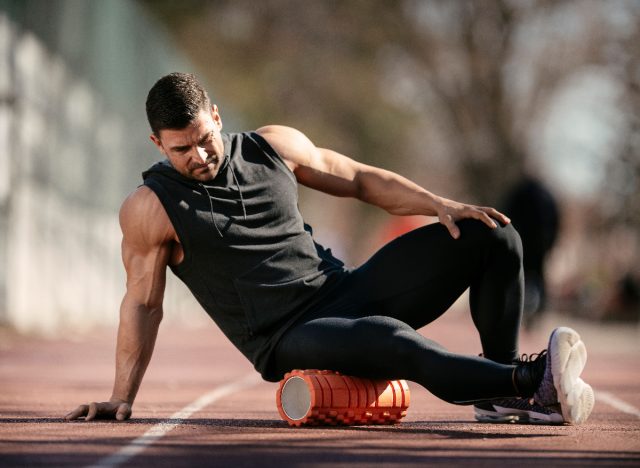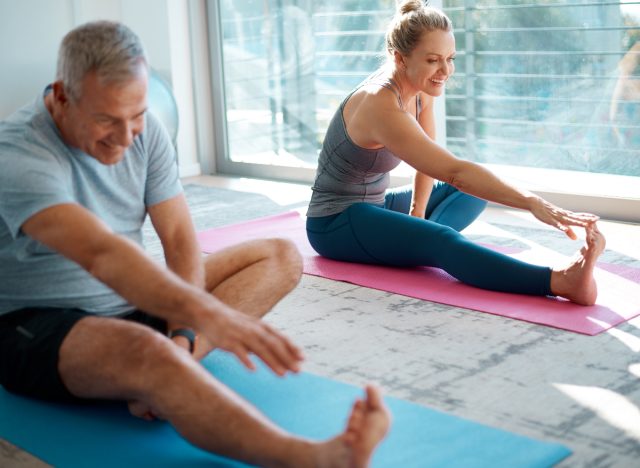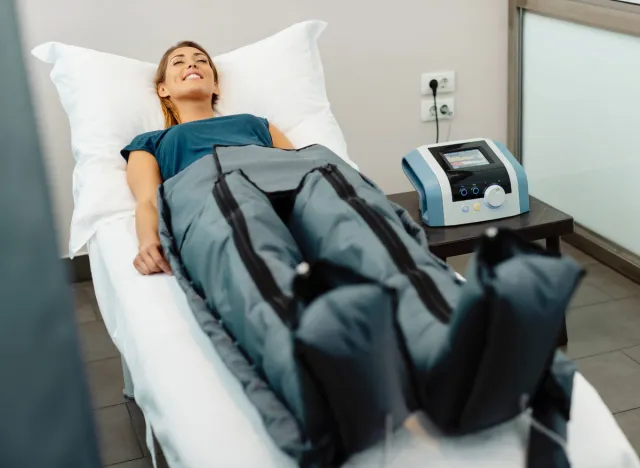11 Tips To Maximize Muscle Recovery

Did you know that rest days are just as important as the workouts themselves? It’s essential to give your muscles a break, as they need sufficient time to recover and repair between sweat sessions. In addition, rest days are imperative to prevent excess joint strain and overtraining—both of which can keep you away from the gym. From properly managing stress to implementing methods like massage therapy into your routine, we spoke with personal trainers who break down the best tips to maximize muscle recovery.
“Nobody, not even elite athletes, can continue to perform at a high level for an extended period of time without taking proactive rest days and scheduling de-load periods into their training,” explains Amanda Capritto, CPT with PT Pioneer. “Eventually, no matter the sport or type of training, if you keep exposing your body to intense training day after day after day, you will become susceptible to overtraining syndrome and/or injury.”
Jordan Fernandez, CPT at Trainer Academy, recommends carving out time for at least one to two rest days each week. However, this depends on your current level of fitness, the intensity of your workouts, and your overall lifestyle.
Now, let’s dive into the best tips to maximize muscle recovery, according to Capritto and Fernandez.
Make your bedtime routine as relaxing as can be.

“Sleep is where the vast majority [of] repair and restoration processes occur in the human body,” Fernandez tells us. “Aim for seven to nine hours of sleep a night. If you are consistently getting less sleep than that, you are not giving your body enough sleep time to recover properly, and your performance will suffer eventually.”
Make sure your nighttime routine is optimized to promote a restful night’s sleep. Before hitting the sheets, you may find it helpful to do a few gentle yoga stretches, soothe your muscles in a warm bubble bath, or do some candlelit reading. In addition, your sleep space should be cool, dark, and free of blue-light devices.
Hydrate.

“Staying hydrated is good general health advice, but it is especially important [in] regards to workout and muscle recovery,” explains Fernandez. “Adequate hydration in the muscles is needed to remove the waste products that happen during workouts.”
Fernandez recommends drinking a glass or two of water before and after working out to stay adequately hydrated and offset an increased body temperature and sweat production.
Eat plenty of nutrients.

Diet is another main player in successful muscle recovery. “A balanced diet with plenty of protein, carbohydrates, healthy fats, vegetables, and fruits to provide vitamins, fiber, and minerals is necessary if you want to maximize your long-term gains,” Fernandez says.
He suggests implementing the 80/20 rule into your routine: consuming “healthy foods” for 80% of your diet and “fun foods” for the additional 20%.
Focus on post-workout nutrition.

Post-workout nutrition doesn’t mean downing a protein shake five minutes into your sweat session; rather, you should not wait long post-workout to consume a nutritious meal.
“This should definitely include protein and carbohydrates to give your body fuel to repair and amino acids to use for muscle protein synthesis,” Fernandez points out.
Emphasize active recovery.

You don’t have to be totally inactive on rest and recovery days! In fact, Fernandez encourages you to practice active recovery. For example, consider stretching, yoga, light walks, and other low-impact activities to get your blood flowing and your body moving without adding unnecessary stress to your body.
“Be sure that you adjust your low-intensity exercise based on your current fitness level,” he adds. “For very fit individuals, low intensity is going to look different than for somebody who is newer to working out.”
Foam roll.

Tools like passive stretching and foam rolling can be incredibly beneficial during recovery periods to alleviate any muscle stiffness caused by working out.
“[While] you’re not necessarily going to get better gains just because you stretch and foam roll, if it helps you feel better and relax, it can be a good part of active recovery,” says Fernandez.
Listen to your body.

Always listen to your body! Being mindful of your body’s cues is key to developing a well-rounded approach to fitness, Fernandez notes.
“There are times when you might not feel like working out, and you have to push through,” he says. There are other times [when] your body will [tell] you it’s too fatigued to work out, and you should consider postponing your workout until the next day. There is a fine line between these two situations, but as you explore your fitness journey, be sure to dial in the difference [between] not feeling like it [and] legitimately needing the rest day.”
Implement stress-management techniques.

Research shows that being stressed can increase cortisol. That means being chronically stressed causes your cortisol levels to always be elevated.
“As a stress hormone, cortisol naturally rises during workouts and is an important component of an overall healthy endocrine system,” explains Fernandez. “However, chronic stress that keeps cortisol elevated has a very detrimental effect on recovery, including inhibiting muscle growth and promoting fat storage.”
If you get stressed out easily, pinpointing the right stress-management techniques for you is a smart idea to maximize workout recovery and boost your overall well-being. “That could be meditation, therapy, ensuring you take adequate time off from work, and anything else that [reduces your stress] in your subjective day-to-day experience,” Fernandez offers.
Do a cool-down.

Rather than running from your workout straight to another commitment, Capritto recommends performing a five to 10-minute cool-down.
“Allow your body to return to homeostasis while doing some gentle static stretches or getting some leisurely steps in,” she suggests. “While evidence on the benefits of cool-downs is mixed, almost every athlete and serious gym-goer will tell you that they feel better and perform better in the next session when they engage in cool-down periods.”
Cut back on alcohol.

As fun as enjoying your favorite blend of wine or a chilled beer post-workout may sound, “its pleasure will be short-lived,” Capritto cautions.
“Numerous studies confirm the negative effects of alcohol on health, fitness, and athletic performance,” she explains. “Alcohol is known to limit muscle protein synthesis (the process by which new muscle tissue is created) and negatively impact muscle glycogen replenishment (necessary to maintain stores of energy in the muscle for exercise).”
Try compression therapy.

Another tip from Capritto? Consider compression therapy.
“Compression garments and devices alter the flow of blood and lymphatic fluids through the body and can relieve swelling where used,” she explains. “As for how this type of therapy can aid muscle recovery, studies suggest that it may reduce inflammation after training. Some research also suggests that compression therapy can reduce post-workout muscle soreness when worn immediately after exercise. Evidence is far from conclusive but is promising.”
- Source: Effect of increase in cortisol level due to stress in healthy young individuals on dynamic and static balance scores
- Source: Interaction between alcohol and exercise: physiological and haematological implications
- Source: Alcohol Ingestion Impairs Maximal Post-Exercise Rates of Myofibrillar Protein Synthesis following a Single Bout of Concurrent Training
- Source: Effect of Compression Garments on the Development of Delayed-Onset Muscle Soreness: A Multimodal Approach Using Contrast-Enhanced Ultrasound and Acoustic Radiation Force Impulse Elastography









